- HOME
- Alumni News
- Activity Reports
- Amra’s Activity Report
Activity Reports
Amra’s Activity Report
![]() Assessment of Business Operations
Assessment of Business Operations
SAORI Organization (SO) Kampong Chhnang Province, Cambodia
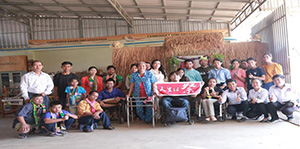
Prepared by: Catalyste + Canada Dave Smith VA # 12629 April 2023
 |
 |
Assessment of Business Operations: SAORI Organization
EXECUTIVE SUMMARY
This report has been prepared further to consultations and an examination of the SAORI Organization in Kampong Chhnang, Cambodia. The main highlights of this report are as follows:
- The governance structure of the organization operates with a Board providing policy direction and guidance for the SAORI organization seems to work well. The recent Board meeting was held on April 8, 2023 and was observed by the Catalyste+ advisor.
- There is a shortage of equipment, particularly weaving machines, and for other office equipment, which could allow for greater production of weaving products, and additional employment opportunities for people with disabilities. Building renovations need to be completed for the SAORI space.
- SAORI should explore finding additional types of employment opportunities, in addition to weaving for persons with disabilities. These may include recycling and sorting, IT functions, pottery-making and others which may be determined possible.
- SAORI to advocate for a Waste Management recycling program in Kampong Chhnang and in Cambodia.
- There is no consistent stream of funding or revenue to allow for the sustainability of the SAORI organization, as funding is not available through Government, but from external international donated sources, which have specified short-term time horizons and all funding for projects expired in 2022.
- SAORI needs to be assertive, with urgency, in pursuing international or local area donor funding and attempt to have funding for the expansion needs provided, over a longer- term period (possibly over a 5-year term). After a 5-year period, sustainable and reliable markets may be established and production will match the demand for the production. The target is to be a sustainable organization where SAORI revenues equal or exceed expenses in 5-year time.
- The assistance of a person with expertise in fund-raising would help the SAORI organization. SAORI, through the Catalyste+ office in Phnom Penh, may wish to request this assistance
- The assistance of a person with expertise in marketing – developing a Branding and Marketing strategy and identifying target markets, would help the SAORI organization to move forward. SAORI, through the Catalyste+ office in Phnom Penh, may wish to request this assistance
- Other recommendations to assist the SAORI organization in strengthening the organization and the business functions are also included in the report
Assessment of Business Operations SAORI Organization (SO), Kampong Chhnang Province, Cambodia
Table of Contents
1.Background
-The Assignment Request
-SAORI Organization
-Catalyste+ (formerly CESO-SACO Canadian Executive Services)
- Population and Geographic Statistics: Cambodia, Kampong Chhnang
2.SWOT Analysis: Strengths, Weaknesses, Opportunities, Threats
3.Directions Moving Forward
- Issues and Challenges
- Actions Recommended
- Priorities (immediate/short-term, medium-term, longer-term)
- Monitoring and Evaluation
4.Conclusion
APPENDICES
- Financial Plan Disclosure
- Listing of meetings held during assignment
- Combating Plastic Pollution in Cambodia
- Photos Taken during assignment
1.0 BACKGROUND
1.1 The Assignment
The SAORI Organization have requested the assistance from Catalyste+ to evaluate the operations and financial status of projects undertaken through the organization. That assessment to include:
- assist in defining business needs
- identify problems that hinder business growth
- recommend solutions
- look into business performance indicators including organizational management + product development + sales and marketing + finance + environmental
sustainability + partnerships + customer service
This needs assessment report will follow a process of determining and addressing needs, or "gaps" between current conditions and desired conditions or "wants". The report will look at discrepancy between the current condition and wanted condition and examine what can be done to improve current performance or to correct a deficiency. This report to include recommended actions, priority timing, monitoring and implementation for the actions recommended.
1.2 The SAORI Organization
SAORI is an international non-government organization which has been introduced in more than 45 countries in Asia and the middle-east. The organization focuses on initiating and supporting rehabilitation centers for people with disabilities. The organization exists as a social enterprise to assist those with special needs but also having a focus on economic advancement and through business development in identified sectors.
In Cambodia, the SAORI local non-government organization was established in 2009 by young professional people with disabilities. Um Amraroth, the Executive Director and member of the SAORI Board in Kampong Chhnang, has on occasions, traveled to Osaka Japan and received training. SAORI supports people with a wide range of disabilities through:
- Training in hand weaving and eco-friendly handicraft products.
- Having people with permanent disabilities develop the ability to generate income, gain confidence and reintegrate into the community
SAORI are also engaged with governments and other organizations, in efforts to achieve action in supporting the self-reliance for people with disabilities and to achieve action and momentum in community infrastructure developments, so that those with disabilities can be more fully integrated into society and not be excluded and isolated.
SAORI advocates for a caring society, where there is a duty in the community to accommodate those with disabilities through accessibility infrastructure and opportunities for self-reliance and economic opportunities, to the extent possible.
a) The Vision
- To be an agent for the creation of a society where people with disabilities will have the opportunity to study skills, obtain decent employment, earn a living and live a dignified life.
・The Company Ethic
Being a compassionate, efficient, competitive organization that promotes providing livelihood for physically challenged workers as well as assisting the community as a partner in the provision of social services to physically challenged individuals.
・Core Values
- SAORI believes in being a living expression of its values. In so doing, they will wear them (the values), speak them and make decisions aligned with them. The company will always embody strong held values as part of its service and business operations:
-Cultural and ecological consciousness
-Law abiding
-Social responsibility
-Spiritual consciousness and integrity
-Competitiveness
・Missions
- To provide suitable vocational skills to improve income, livelihood and the economy through SOARI free hand weaving. We encourage physical expression of intellectual pride in the achievement of new developments
- The development of all people with all kinds of disabilities through integration of persons with disabilities into vocational training
- To provide training in hand weaving skills to support the development of people with disabilities
- To promote the advancement of accessibility through social activities to meet the needs of people with disabilities
- To promote and develop economic opportunities for the physically challenged individuals
1.3 Population Statistics and Geographic Information
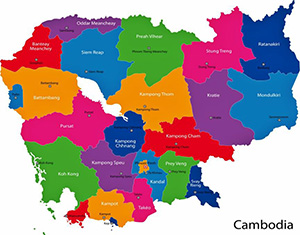
Cambodia is located in southeast Asia and is bordered by Thailand on the west, Laos on the north, Viet Nam east and the Gulf of Thailand to the south. Cambodia has a population of 16,493,000. Kampong Chhnang is a city with a population of 41,000 people, located 91 kilometers north of Phnom Penh, the capital city of Cambodia containing a population 2.6 million. The Province of Kampong Chhnang has a population of 527,027 Cambodia is 1/3 the size of France. It has a large rural population compared to many other countries and the population is also quite young, when it is compared to other countries. (source: Google Wikipedia- 2019 census).
1.4 Catalyste+ (formerly the CESO - The Canadian Executive Service Organization)
Catalyste+ is an agency funded by donations, corporations and the Federal Government and it uses volunteers to assist developing countries. Catalyste+ aims to strengthen social and economic well-being through engagement of skilled and experienced Canadian volunteers working cooperatively with our partners to effectively service client needs. Key is to transferknowledge and skills through a mentorship and advisory framework.
The mandate of Catalyste+ is to encourage the fair and equitable treatment of women in the workplace in a respectful workplace.
Catalyste+ works in many areas around the globe and are pleased to work on this project in Cambodia.
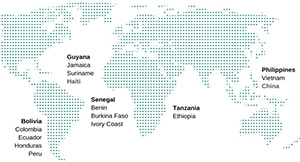
The SAORI organization has requested Catalyste+ to assist them with their business needs.
2.0 SWOT ANALYSIS – Strengths, Weaknesses, Opportunities, Threats
This document represents the information needed for a Business Plan. The Business Plan is the core strategic document which an organization or business to operate with an efficient level of service. The plan should describe what the business is all about and the direction in which an organization wants to go. However, the Business plan is just a plan fixed in stone, but it needs to be flexible and adaptable for changing conditions and opportunities which may occur in the future, because we cannot always predict the future. It will act as a logical, rational path or direction for the organization. It will provide a framework for guiding and evaluating the accomplishments.
The SWOT analysis is an important tool to use in understanding the organization. It helps to assess both internal and external influences on the organization and it allows the organization, as a team, to look at helpful and harmful factors effecting the organization’s ability to achieve its mission and its goals + objectives.
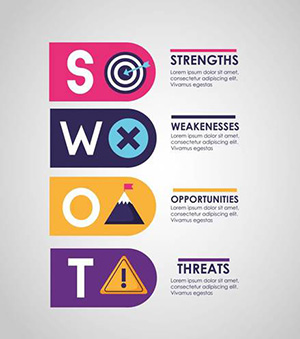
The business strategies or Business Plans have a vision and mission, with goals and objectives and they should contain actions to help to achieve the mission. The Strategic approach as follows:
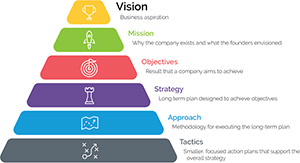
The manner of proceeding to implement the strategic plans to follow a path as follows:
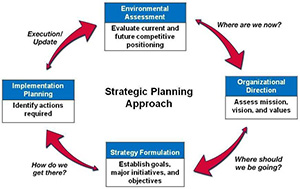
SOARI officials and the Catalyste+ VA held a SWOT session on April 10, 2022.
Considerable discussion took place with the SAORI staff members (5) and a recorder.
The results are show in the chart which follows:
SAORI SWOT Analysis
| STRENGTHS |
|
|
| Partnership |
|
|
| Good product |
|
|
|
raw materials-local materials for equipment other Countries | |
| WEAKNESSES |
Some food Supplement necessary
|
|
| OPPORTUNITIES |
|
|
| THREATS |
|
|
3.0 Directions Moving Forward
From the background information on the SAORI Organization and with the information obtained from the SWOT analysis session, the business needs assessment will focus on specific topics which are important for running a sustainable business. These topics focus on the gaps identified in the operations and actions needed to move forward to fulfill the businesses vision, mission and provide direction for efficient business operations now and into the future.
3.1 The Organization - SAORI Organization: Structure
The SAORI Organization has launched this business for weaving products in order to enter a business sector in which people with disabilities can participate and take advantage of a looming market opportunity. The corona virus pandemic has slowed this launch, but it is now the time to move forward. This document is prepared with the intention of allowing SAORI to move forward and grow with successful business operations - product sales -and to continue as a social enterprise.
Presently, Um Amraroth Executive Director, the current operator of SAORI, employs workers and manages accessibly challenged workers and she oversees the development of the weaving products being produced. There are currently 5 SAORI member staffs and the Organization Chart below indicates an organization with functions mobilized to function efficiently towards being a fully sustainable organization.
A Board has been established to provide policy guidance, high-level decision-making and direction to the Executive Director. The Board consists of the Chair Chan Sarin and 4 Board members. The Catalyste+ CA observed the SOARI Board meeting on April 8, 2023 and the board and best practices for organizational governance worked well. No changes to governance appear to be necessary.
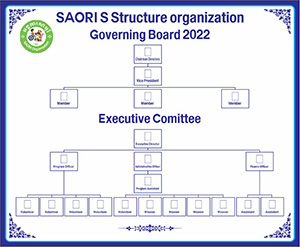
The Executive Director handles all functions which include staff member leadership and marketing and promotion, partnership coordination, due diligence and book-keeping. Transportation/ product distribution functions are through motorbike delivery, through mail or contracted out independently, and the contracted services are a high cost to the organization. If the organization were able to purchase a truck for deliveries, over the long-term, there may be savings for the shipping costs, as an alternative to this outsourcing. The workload is heavy for the Executive Director and an Administrative Assistant position would greatly assist in reducing the high workload for the Director.
In the future, more business expansion is desired for the operation. That would mean increasing the production of the weaving products currently produced or diversifying and finding new production lines or service functions for the organizations. Accommodating a larger workforce through incorporating more persons with disabilities as part of the business will be necessary to accomplish SAORI aspirations for the future.
That may include SAORI taking on new functions and expanding its current role. SAORI could become a “go-to agency” for finding employment for persons with disabilities and they may maintain a roster of potential individuals who may be suitably employed in certain employment sectors. Waste recycling seems to be a challenging issue in Kampong Chhnang and in Cambodia. In some other countries, recycling centers employ persons with disabilities (such as those with autism and downs syndrome) to sort and package recyclable products. SAORI could pursue involvement in the recycling field, and work with the current recycling contractor and perhaps the Ministry of Environment in this regard. Disabled persons in wheelchairs may easily work at desktop computers and perform IT functions and SAORI could act as an agent to promote training and employment opportunities for persons confined to wheelchairs who have physical disabilities.
Actions:
- SAORI to maintain the current governance structure
- After completion of this report, implement this report as a business plan with framework for business expansion, including new initiatives.
- Business expansion or new opportunities to be explored, include:
-current weaving items and handicrafts
-a role for channeling training and employment for people with disabilities
-a recycling and sorting facility with employment of physically challenged individuals, recruited by SAORI
-training of persons with physical disabilities who are confined to a wheelchair, in IT computer functions (including assistance with job placement) - Expansion priorities be established and a monitoring and evaluation process be in place (see below) to ensure there is execution of measures needed to improve and expand SAORI functions.
| Priority - Target for completion | Delegated to | Indicator of Progress made: quantitative / qualitative | Comments on progress = internal check | Completion = Sign-off |
| Actions - 1.Business Plan implementation: On-going 2. Expanding weaving production: -immediate 3. Training + job placement -medium-term 4.Expansion of the function of SAORI (IT, recycling, other) -medium to long- term 5. Hire an Administrative Assistant -Immediate to medium-term |
Executive Director and the BOARD | monthly |
* Priorities are shown as Immediate (1 year), Medium (2-3 years) and Longer-term (4-5 years). The chart should be examined every 3 months’ time for monitoring and evaluation.
3.2 Human Resources - Staff Member Requirements
SAORI needs to train their members - persons with disabilities - to perform their duties at an acceptable level of proficiency.
As SAORI numbers grow, there needs to be a respectful workplace both internally in the organization but externally through client relationships. Workers - persons with disabilities need to feel safe, protected and fairly treated, without any abuse or harassment taking place. Members need to feel valued and secure in their jobs to the extent possible, but they also need to be competent in their roles to ensure employment longevity. Some services of SAORI are contracted services as part of its network. Some actions for the provision of services in the organization are:
Actions:
- SAORI organization to include provisions relating to Human Resources and maintain:
-work safety and regular living wages and health benefits
-a respectful workplace, without bullying, harassment or abuse taking place; clients relationship and in the workplace generally.
-gender fairness and treatment through training (access to resources), the capacity to participate in decisions (woman’s agency) and policies and actions (enabling environment) in this regard.
-the fair treat and opportunities for peoples with disabilities of all kinds.
-no exploitation of child labour. (laws of Cambodia need to be followed)
- training programs through an NGO or through educational institutes in Cambodia may be requested
-peer Counselling would assist in the full development of the persons with disabilities
-performance guidance and appraisal by the Executive Director, on an interval basis.
| Priority - Target for completion | Delegated to | Indicator of Progress made: quantitative / qualitative | Comments on progress = internal check | Completion = Sign-off |
| 1. Implement Human Resources policies: -On-going, medium-term 2. Establish peer Counselling Immediate – on-going 3. Performance appraisal: -annually |
Executive Director or employer placed by SAORI in recycling / IT | Personnel report |
* Priorities are shown as Immediate (1 year), Medium (2-3 years) and Longer-term (4-5 years). The chart should be examined every 3 months’ time for monitoring and evaluation.
3.3 Partnerships, Networks and the Supply Chain
SAORI has developed relationships and a network with both domestic and international agencies who have provided assistance - some for assisting with the physical and mental needs of the persons with disabilities. There has also been assistance with the securing machines and equipment, training, and obtaining materials through the supply chain currently from Japan and Thailand.
SAORI was established and maintained relationships and support, at times, with key public government agencies or sectors:
Kampong Chhnang City - roads, water
Kampong Chhnang Electrical Utility - power supply (grid)
Refuse (garbage collection) - Private contract with Kampong Chhnang City
Cambodia: Department of Social Affairs, Veterans & Youth Rehabilitation - helping orphans and vulnerable children, including people with disabilities (social work)
Kampong Chhnang Province: Department of Commerce - issue business services license, find markets for citizen products
Kampong Chhnang: Department of Culture and Fine Arts - promote and inspire Khmer cultural activities and also maintain and protect them
Kampong Chhnang: Department of Labour and Vocational Training - regulate work conditions, minimum wage, technical and vocation education and training, job market information
Kampong Chhnang Vocational Training - free study opportunities for students, skills for school drop-outs, other technical and vocational training
Kampong Chhnang Province: Department of Environment - management of the environment, protection of the environment, inspection of exports/imports of species, plants, seeds, etc., sewage, water and solid waste management
Kampong Chhnang Ministry of Public Works and Transportation - design, manage and maintain roadways, and regulate transportation by land, sea + sea ports and railways and logistics
Kampong Chhnang Department of Land Management, Urban Planning and Construction - land management, reduce disputes, construction management
Kampong Chhnang Province: Department of Women’s Affairs - prevent violence against women and children, promote social morality, gender equality
Kampong Chhnang Department of Culture and Religion - priests and Pagoda affairs, promote Buddhism and other religions, prevent fraud in fundraising
Kampong Chhnang Province: Department of Health - public health and reduction of pathogens in the country, manage production of medicines and medical equipment and supplies, strive for maximum quality of public and private health
Kampong Chhnang Department of Education and Youth Sport - promote sports in education, early childhood, primary education and non-formal education, secondary school sports, youth development
Kampong Chhnang Chhnang Province Department of Information - manage the media, instruct journalists to provide responsible journalism and not commit wrong-doing
Kampong Chhnang Province Department of Rural Development - road development, water supply and management services, management of rural sanitary waste, subsidies for toilets
Kampong Chhnang Province Department of Planning - sub-national planning, invest in development plans, procurement, action plans to help poor families
Kampong Chhnang Sangkat - manage and monitor the affairs of communes
Gendarmerie - manage political security, rescue / emergency response, manage crime, drug theft, escapees
Kampong Chhnang Provincial Police Commissioner - ensure the safety and security of people and enforce crimes
ACLEDA Bank - provide an accessible entry to the bank for people with disabilities
ABA Bank - provide an accessible entry to the bank for people with disabilities
AMK Bank - provide an accessible entry to the bank for people with disabilities
PRASAC Bank - provide an accessible entry to the bank for people with disabilities
Amret Bank - provide an accessible entry to the bank for people with disabilities
SAORI also has maintained relationships received support, at times from other international donors. These include:
- Dan Church Aid Donors Saving lives, building resilient communities and fighting extreme inequality is only possible thanks to the continuous support of our international donors,
- Cambodian Mines - Remove Campaign - to promote the abolition of landmines in Cambodia and to support self-independence of the survivors.
- SAORI Thailand and Japan - affiliated organizations specializing in the production of textiles, yarns and textiles and helping with the training of persons with disabilities.
- Center for Community Cultural Development Japan - promotes cultural activities that empower the under-privileged, in particular, for persons with disabilities, migrant workers and the underprivileged.
- Art for all of Japan - promotes the inclusion of a multi-cultural society and diversity, and a society that accepts diversity through art, culture and expression activities.
- Link and Learn - Women with disabilities able to receive support and funding for accessible travel, expense payment and accessibility toilets. Information sharing and exploring new technologies also a role of the organization.
- Voice, Ministry of Netherlands - an innovative grant facility to support rights holders and groups facing marginalization or discrimination in their efforts to exert influence in accessing productive social services and political participation.
- East Osaka Partner of Japan - center for consultation support business including peer counseling, independent living programs, advocacy activities and volunteer training.
- Mainstream Association - supported SAORI for $5000 under the independent living program, towards hand weaving machines
- NPO SAORI HIROBA - supports persons with disabilities to be self-reliant and with emphasis on training and programming for the development of weaving products.
- SOARI -HIROBA (VSA Arts of Japan + founded by the USA) - creates learning opportunities for persons with Disabilities, including in leadership, management and program development functions.
- Impact HUB - empowering youth and start-ups in Cambodia to continue to contribute to social and environmental entrepreneurship and leadership.
- Japanese Society for Rehabilitation of Persons with Disabilities - to promote projects on rehabilitation for persons with disabilities through international cooperation based on investigation and research.
- Catalyste+ Canada - helps countries through mentorship and training and consulting projects to assist developing countries to improve economic conditions and reduce or eliminate poverty.
It should be noted that other international agencies, through their work in Cambodia, have also positively impacted SAORI and the work they do. The UNDP - United Nations Development Program, Australian Aid and Unicef assisted in the production of manuals regarding accessibility standards - pertaining to accessible adaptations streets sidewalks, public places and buildings. These standards need to be implemented and mandated by governments in Cambodia, and also be implemented through private developments which occur. Several banks in Cambodia have already demonstrated leadership in this regard.
Actions:
-SAORI to communicate, coordinate and execute its business services working with the key long-standing partners and agencies in sectors where networks are beneficial.
-SAORI to forge new strategic alliances with identified partners aimed at achieving the supports needed in this report to expand the SAORI organization and make it sustainable (refer to page 21 - Fund-raising and Donor Requests). Each project will require assembling a best suited team of partners
-SAORI partnerships, where possible, be formalized through contractual. arrangements or letters of understandings to demonstrate a binding commitment. Attempts be made to forge long-term relations through formalizing binding commitments, to avoid complacency.
-To contribute to on-going visibility and communications, SAORI to maintain a newsletter and an Annual Report to be made available for stakeholders and partners.
| Priority - Target for completion | Delegated to | Indicator of Progress made: quantitative / qualitative | Comments on progress = internal check | Completion = Sign-off | |
| Partnership arrangements adoption of practice Monthly newsletter, annual report, social media -initiate + 0n-going | Executive Director and BOARD | Standard practice; annual reporting |
* Priorities are shown as Immediate (1 year), Medium (2-3 years) and Longer-term (4-5 years). The chart should be examined every 3 months’ time for monitoring and evaluation.
3.3 Adapting to Changing Conditions
The future is uncertain and an organization must be flexible and forward thinking and be able to respond to opportunities and changing conditions, either negative or positive.
Action:
SAORI must be in tune with changing conditions (both positive or negative) and new opportunities and be prepared to adjust and adapt to unanticipated events or trends. Through careful reflection - budgets, programs and resources may need to be revised or changed within the term of business planning, to maintain a strong, sustainable organization.
| Priority - Target for completion | Delegated to | Indicator of Progress made: quantitative / qualitative | Comments on progress = internal check | Completion = Sign-off |
| Be aware of changing conditions -On-going | Executive Director, Board, staff members | Keeping progress positively moving forward; annual report of change |
* Priorities are shown as Immediate (1 year), Medium (2-3 years) and Longer-term (4-5 years). The chart should be examined every 3 months’ time for monitoring and evaluation.
3.4 Financial Management
Financial Management is essential to the successful operation of any business organization. There needs to be regular sustainable, consistent funding and revenue generation. This has been a problem because:
-there are no consistent and predictable funds coming from Governments or NGO’s This has been a challenge.
-marketing and sales have been of a modest level
-the pandemic disrupted normal life and there was no funding or revenues during that period (2020-22)
Once more regularized financing is established, annual and long -term budgets should be prepared showing anticipated revenues and expenses and with an eye on the aspirations of the organization looking into the future. Because of the disruption during the corona virus, the revenue flow predictions might best benchmark using 2019 and then 2022 years.
An additional issue of concern is following procedures to have proper documentation for expenses paid and revenues received with invoices. Larger amounts of money need to be deposited into the bank and there should be only an appropriate, limited amount of cash on hand, as an operational policy.
Actions:
- Maintain annual budgets for guiding spending in relation to anticipated revenues and expenses.
- Follow best management practices for financial accounting and the management of fiscal affairs.
- Ensure that an annual audit is done.
- For product sales, use targets target:
-Growth production in the numbers by 5-10% of numbers each year.
-Growth in the amount of revenue to the organization by 5-10% each year. - There needs to be consistent invoice and receipt procedures with transactions recorded on a regular set basis per book-keeping
- SAORI to contract the services of an accountant for official financial service documentation required
- Contract services of a qualified accountant to be retained.
- Payments through ATM cards for product sales or supply purchases (ABA Bank and others) should be facilitated. (QR code).
FINANCIAL REPORT INCOME+ % Change from Previous Year (Tracking Procedure Example)
EXPENDITURES
| Expenditure Area | 2022 | % | 2023 | % | 2024 | % | 2025 | % | 2026 | % |
| Telephone + Internet | ||||||||||
| Office rent | ||||||||||
| Website maintenance | ||||||||||
| Travel and accommodation | ||||||||||
| Licenses and subscriptions | ||||||||||
| Salaries + Renumeration | ||||||||||
| Marketing | ||||||||||
| Bank balances | ||||||||||
| Packaging for products | ||||||||||
| Printing of the labels | ||||||||||
| Taxes | ||||||||||
| Purchasing supplies | ||||||||||
| Transportation distribution costs |
Action:
- SAORI should keep track year-by-year of the percentage spending in key areas as a tool for monitoring the direction and control of its spending, recognizing that spending percentages may change each year due to shifts or changes in the operation or supply chains. An example might be opening of new satellite offices, which may increase the percentage spending in that category.
Fundraising and Donor Requests
- The SAORI Board and Executive Director to continue to advance the sponsorship initiative to aid and assist persons with disabilities. (Board Chair)
- SAORI should pursue government assistance and donors from international or Cambodian sources to assist them with the financing for business development and potential expansions.
- SAORI needs to develop a fundraising strategy and develop carefully articulated, professional proposals to donors or to Government agencies. Follow the strategic approach as shown in the graph below.
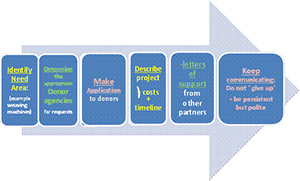
- SAORI needs to develop a fundraising strategy and develop carefully articulated, professional proposals to donors or to Government agencies. Follow the strategic approach as shown in the graph below.SAORI to request assistance from Catalyste+ for a person with fundraising expertise, who could conduct an assignment for:
-the development of a fundraising campaign
-an approach to request funding (template request + coaching on donor requesting)
| Priority - Target for completion | Delegated to | Indicator of Progress made: quantitative / qualitative | Comments on progress = internal check | Completion = Sign-off |
| 1. Board’s Fundraising Initiative -On-going 2. Donor requests, new donor approach -immediate 3. Catalyste+ assignment - immediate to mid-term |
BOARD Executive Director, contracted accountant per donor financials required | Daily/weekly workload planning and reporting |
* Priorities are shown as Immediate (1 year), Medium (2-3 years) and Longer-term (4-5 years). The chart should be examined every 3 months’ time for monitoring and evaluation.
Benevalent Contribution to Finances - Um Amraroth and Family
The SAORI Organization in Kampong Chhnang would not be possible without the financial contributions, dedication and leadership exhibited by the Executive Director, Um Amraroth. Donations, grants and assistant received by SAORI have been sporadic and unpredictable. Um Amraroth was a polio victim herself and became a school teacher. Through teaching and tutoring Um Amraroth has continually provided supplementary, and often “the lions share” of SAORI funding through money she earns from in her second job as a part-time teacher, aside from the work she does for SAORI.
The parents of Um Amraroth have also donated land and a building for the offices for SAORI, including areas for the weaving work they do and for part-time teaching. Expansion of SAORI will require office renovations and expansions. There are no costs accruing to SAORI for use of the facility. This has been a benevolent contribution by the family.
It is hoped that a model of funding can be established where SAORI business revenue can sustain the organization and reduce the burden which is currently for the most part, in the hands of one person. Some predictable donor funding to assist business expansion is needed immediately to get SAORI on this track.
3.5 Equipment and Company Asset Management
Business Initiatives for the 1-5 year time period
Insofar as business expansions are concerned, the following equipment is needed to boost the business production, currently being weaving products:
1. Purchase 6 more weaving machines
2 Purchase3 additional computers
3. Replace all the benches and tables / desks in the training area
4. Complete the construction of the buildings on the site to be used by SAORI
5. Construction and renovations of the SAORI building to be fully accessible and meeting the new accessibility standards of Cambodia
6. Of the highest priority, complete a fully accessible washroom at the earliest stage of renovations for the SAORI facility
7. Include upgraded storage areas for supplies and materials to be included in building construction
8. Plan for clean energy - such as solar panels, to be the source of future power for the facility
9. Purchase a new truck and replacement of the motorbike for SAORI transportation or production supply delivery purposes
10. Hire more disabled member workers to increase the capacity of SAORI to increase their capacity the production of weaving products and as revenue from SAORI business sales occurs. SAORI is aware that there are disabled individuals, “waiting in the wings”, for an opportunity to work and earn a living wage, in a facility which is accessible.
Estimated Budget(The Budget prices are estimated; prices may increase or decrease)
| Items Needed | Quantity | Estimated Amount/Budget in Khmer Reil /USD/Bath |
|---|---|---|
| Weaving machine | 3 - immediate 3 - medium to long- term |
6349.62$ |
| Computer purchases -3 | 1 - immediate 2 -medium |
13,650.00 $ |
| Replacement of desks / tables and chairs | 1/3 - immediate 1/3 - medium 1/3 - long-term |
3,150.00$ |
| Complete construction of SAORI Building on the site | Major project - medium - long-term |
80,000.00$ |
| Fully accessible construction in building | In conjunction with the building construction | 3,000.00$ |
| Accessible washroom for SAORI building | 1 - immediate | 3,000.00$ |
| A pick-up truck for delivery | 1 - long-term | 2,800.00$ |
| Motor bike | 1 - medium | 3,000.00$ |
| Solar panel installation for power for the building | As determined | 500.00$ |
* Priorities are shown as Immediate (1 year), Medium (2-3 years) and Longer-term (4-5 years). The chart should be examined every 3 months’ time for monitoring and evaluation.
Actions:
- SAORI to maintain an update inventory of its assets and create a plan for supplies + equipment replacement over time
- SAORI to maintain a budget for the maintenance of its assets and include in that budget funds for replacement or updating of its offices and equipment and vehicles over time, allowing for continued, efficient operation.
| Priority - Target for completion | Delegated to | Indicator of Progress made: quantitative / qualitative | Comments on progress = internal check | Completion = Sign-off |
| Immediate priority expenditures = gray Medium priority expenditures =green shade Long-term priority expenditures = blue |
Executive Director | Purchase of goods + equipment over time |
* Priorities are shown as Immediate (1 year), Medium (2-3 years) and Longer-term (4-5 years). The chart should be examined every 3 months’ time for monitoring and evaluation.
3.5 Product Development and Revenue from Sales
There are a variety of products processed from by SAORI. These include the weaving products and handicrafts. There may also be additional products produced or services rendered by the organization in the future. In order to capture the widest range of clients and to maximize revenues and the benefits from economic development, SAORI should be strategic and organized in their approach.
Actions:
- Pricing Strategy-SAORI to establish a pricing strategy. This to be based on the cost of acquiring the product, fairly established labour costs, production costs, packaging materials, transportation costs and a margin of profit. Prices may be established on a two-tier basis:
a.) domestic rates
b.) international rate + export component (tourism)
The strategy to be reviewed at least every year, considering any cost changes in the supply chain and comparing with the rates offered by the competition.
- Product Strategy- SAORI to develop special supply options to fit the desires of the customer (large volume, small volume, customer pick-up vs. delivery to the customer).
Future Expansion-It is possible that with expansion, satellite office distribution centers may be set up in other regions throughout Cambodia.
| Priority - Target for completion | Delegated to | Indicator of Progress made: quantitative / qualitative | Comments on progress = internal check | Completion = Sign-off |
| Pricing + Product Strategy -On-going at least every year for pricing + product strategy | Executive Director + the Board, Accountant advice | The monitoring of revenues + sales in relation to the pricing + product outcome |
* Priorities are shown as Immediate (1 year), Medium (2-3 years) and Longer-term (4-5 years). The chart should be examined every 3 months’ time for monitoring and evaluation.
3.6 Branding and Marketing
The development of a brand is the fundamental building block from which all marketing communications and behavior should flow. There must be harmony between the perceptions of the customer and the actual activity or experience as it is presented in the marketing communications (i.e. what you see is what you get). The brand is not just a slogan or a logo; but it encompasses all aspects of the service, the delivery of service and how that service is initially perceived.
SAORI may wish to upgrade its marketing and branding including a more expressive logo and slogan. The marketing information needs to be good quality. An overall marketing and branding strategy in all aspects should be examined and perhaps be renewed or refreshed. The marketing and branding program will need to be developed which matches the current and potential markets.
The customers of the company include the following:
- citizens
- tourists
- uniforms - band hats / scarves
- Shops / Exhibition booths
SAORI have a list of potential Countries where the products might be marketed and exported to. These include Thailand, Japan and Hong Kong. If other opportunities emerge in the future, there will be flexibility and adaptability to consider them.
Actions:
- A Marketing and Branding Strategy should be developed.
- SAORI may approach Catalyste+ (or another agency) to request an assignment to refresh the current marketing and branding in place.
- There may be a need for a second assignment request to identify where and how to market the tourism promotions (ie. assistance with IT for social media / website venues).
- An appropriate slogan to compliment the logo in place, should be consistently applied for use through the marketing.
- All communications by websites, social media or hard copy material should consistently have applied.
- Product packaging and labeling should be consistent in all references.
| Priority - Target for completion | Delegated to | Indicator of Progress made: quantitative / qualitative | Comments on progress = internal check | Completion = Sign-off |
| Current marketing + developing a Branding + marketing strategy - Immediate to medium-term | Executive Director, BOARD | Development of branding for marketing, tagging = labeling of products |
* Priorities are shown as Immediate (1 year), Medium (2-3 years) and Longer-term (4-5 years). The chart should be examined every 3 months’ time for monitoring and evaluation.
3.9 Customer Service
Customer service can be a “deal-breaker” when it comes to booking of customers for tourism. Potential customers need to feel comfortable in their dealings with SAORI. Great customer service may result in repeat customers and promotion by “word of mouth”. Employees need to be well informed of the company policies and should be able to anticipate most of the questions or concerns which may be directed to them.
Some key aspects of customer service to be routines followed by staff are:
- Be polite at all times and do not argue with customers.
- Be responsive to any requests and try to resolve them efficiently and with minimum delay.
- In-person dealings - make sure staff portray a positive image, dress tidy and maintain proper hygiene.
- Always be respectful and do not use inappropriate language or gestures.
- Document all complaints and respond to them clearly, politely and with accurate information.
- Undertake survey questionnaires (simple and short) to gauge customer satisfaction and as a tool to improve service
- At trade shows, do not leave the booth unattended if possible.
Actions:
- SAORI should apply consistent best practices in customer service
- SAORI should provide regular information on customer service to sales representatives involved with the marketing and sales of the products
- On-line customer service training to be undertaken by SAORI member staff, through a site, similar tosuperhost.ca in Canada
- A survey of the tourists should be offered so that feedback is provided from both product satisfaction and customer service.
| Priority - Target for completion | Delegated to | Indicator of Progress made: quantitative / qualitative | Comments on progress = internal check | Completion = Sign-off |
| Customer Service Medium | Executive Director | Scheduling of refresher program |
* Priorities are shown as Immediate (1 year), Medium (2-3 years) and Longer-term (4-5 years). The chart should be examined every 3 months’ time for monitoring and evaluation.
3.7 Green Operations and Environmental Responsibility
SAORI operates, to the extent possible, in a manner to limit and minimize any environmental damage and strives to impose a minimal footprint. The production of the product materials come from trees and plants which are a receptor of carbon and counter the effects of climate change, so the nature of the business is positive in combating climate change through the carbon capture. There are other practices that can contribute to advancing the environmental management ethic to an even greater extent - sustainability practices that are to be followed now, or in the future for all facets of the business.
Actions:
SAORI shall:
- follow all environmental laws, policies and regulations and cooperate and coordinate with authorities in the implementation of environmentally responsible initiatives
- Investigate and develop alternatives to plastic containers and plastic wrapping with more environmentally friendly ones
- follow sustainable environmental principles, through the use of its building and equipment infrastructure by:
-installing solar panels to be used to generate clean, renewable energy and reduce or eliminate the use of fossil fuels.
-Over the longer term, consider using of electric or hybrid vehicle transportation (motor cycle of truck),or alternatively transiting to low carbon fuels (ethanol, propane, hydrogen, or others), for transportation requirements.
-Consider the use of a bio-gas plant (bio-gas digester) to produce clean energy fuel for uses such as cooking in SAORI
SAORI in its day-to-day actions and behavior shall:
- recycle materials and conserving energy
- having set-points for air conditioning HVAC systems if these are part of the new construction plans
- using LED lighting in all building
- turn off lights, fans and other electronic or mechanical equipment, when they are not in use.
SAORI shall be diligent in water conservation through:
- managing the water supply and in the use of water
- use rain capture barrels
- water saving fixtures taps and for flushing toilets
SAORI may utilize third party expertise to assist them in developing sustainable technologies to advance the target goal of being a net-zero, non-polluting business organization in the future
| Priority - Target for completion | Delegated to | Indicator of Progress made: quantitative / qualitative | Comments on progress = internal check | Completion = Sign-off |
| Immediate to long-term + on- going | Executive Director, the BOARD, members staff | Checking electrical bills, recycling progress, reminder at member staff meetings, practiced regularly in a disciplined approach |
* Priorities are shown as Immediate (1 year), Medium (2-3 years) and Longer-term (4-5 years). The chart should be examined every 3 months’ time for monitoring and evaluation.
3.10 Safety and Security
The safety and security of SAORI workers is of paramount and the company needs to be conscious of providing security. There also needs to be security for the company assets - products, supplies and equipment and the company buildings, whether rented or owned.
Actions:
- SAORI shall ensure that provisions for safety and security of clients and disabled member workers and all are in place.
- SAORI plans to use contracted security guard s for premises protection
- SAORI to provide appropriate security of company assets the use of cameras and locked entry gates to continue.
- Insurance shall be provided to compensate for losses.
| Priority - Target for completion | Delegated to | Indicator of Progress made: quantitative / qualitative | Comments on progress = internal check | Completion = Sign-off |
| Provision of security for protection - Immediate to medium-term | Executive Director + Board | Improvements to be made as revenue and budgets permit |
* Priorities are shown as Immediate (1 year), Medium (2-3 years) and Longer-term (4-5 years). The chart should be examined every 3 months’ time for monitoring and evaluation.
3.9 Education and Training
SAORI needs to have SAORI member staff to be well trained, providing good quality products, efficient production and with good service to the customers.
Actions:
- SAORI should provide training for staff in the following areas:
-weaving production processes
-environmental management, particularly recycling, energy and water management
-customer service
-IT functions and use of computers / data management
-other areas which may be identified - SAORI may partner with training institutes or organizations in Cambodia, to part-take in internet on-line training programs, as necessary.
- SAORI undertake a new role - become a clearing house for a potential workforce to be steered to work opportunities in areas such as weaving and handicrafts, IT computer functions, recycling and sorting and towards other areas which may be identified.
| Priority - Target for completion | Delegated to | Indicator of Progress made: quantitative / qualitative | Comments on progress = internal check | Completion = Sign-off |
| Training for new functions - Immediate - 0n - going | Executive Director + Board | Scheduling training Check progress every 3 months |
* Priorities are shown as Immediate (1 year), Medium (2-3 years) and Longer-term (4-5 years). The chart should be examined every 3 months’ time for monitoring and evaluation.
3.13 Communications Technology and the Internet
SAORI occasionally faces communication challenges, including connections or wifi issues pertaining to telephones, emails, texts and the internet in SAORI offices and in other areas.
Actions:
- SAORI to explore ways to ensure internet -wifi services are available in rural or remote areas when needed.
- SAORI to lobby the national government and internet service companies to provide reliable infrastructure and ensure it is in place for the provision of the internet services in all areas.
| Priority - Target for completion | Delegated to | Indicator of Progress made: quantitative / qualitative | Comments on progress = internal check | Completion = Sign-off |
| Lobbying / advocating for improved internet service - Immediate | Executive Director + Board | Keep records of blackouts or internet failures – respond to each with a request for improvements |
* Priorities are shown as Immediate (1 year), Medium (2-3 years) and Longer-term (4-5 years). The chart should be examined every 3 months’ time for monitoring and evaluation.
3.14 Advocating for Accessibility - The Duty of Society to Accommodate Persons with Disabilities
The National Government of Cambodia have developed standards for accessibility for persons with disabilities, having received assistance from Australian Aid and the UNDP - United Nations Development Program. These were well done, with manuals and brochures and websites articulating high-level guidelines for accessibility design and construction, with graphs and explanations and descriptions. While these guidelines are very well done, the issue is that actual accessibility modifications have been slow to happen. Throughout Kampong Chhnang there are grade level challenges on roads and sidewalks, in and around pagoda, in commercial and residential buildings at entry points and throughout these buildings and at public facilities such as the water park, the city center, the public market and the riverside wharves. The intentions are good, but the actual implementation is “much to little” and “too slow to happen”.
Action:
- SAORI to continue to advocate for more rapid action for the completion of accessibility throughout Kampong Chhnang, so it is a high priority for property owners and governments.
- SAORI to strive to see Kampong Chhnang become a 100% accessible community.
- That strong efforts be made to seek external sources of funding such as from international NGO’s and Governments abroad.
| Priority - Target for completion | Delegated to | Indicator of Progress made: quantitative / qualitative | Comments on progress = internal check | Completion = Sign-off |
| Advocate for Accessibility throughout Kampong Chhnang - Immediate – 0n-going | Executive Director + Board | Strong Advocacy every 6 months or sooner |
* Priorities are shown as Immediate (1 year), Medium (2-3 years) and Longer-term (4-5 years). The chart should be examined every 3 months’ time for monitoring and evaluation.
6.0 Conclusion
It was an honor for the Catalyste+ volunteer to be involved with this project for the SAORI Organization. It is hoped that this will be a useful roadmap for the organization for the period 2023 through to the end of 2027, as it is essential to expand and broaden the organization and its revenue generation, so that it can fulfill its social and economic aspirations regarding employment for persons with disabilities, earning a living wage and broadening accessibility in the community.
Over time, incremental changes can be made to this business planning document in order to keep ahead of changing conditions or unanticipated circumstances.
The Business Plan should be monitored regularly to ensure that operations are taking place in accordance with this document. After 2026, it is suggested a formal deep review of this plan be undertaken, and be accurately updated for the next 5 years, moving forward.
I am deeply grateful for having had this opportunity to assist. Thank you.
David Smith, BA, MCP, Dip. PA, TESOL Catalyste+ Advisor12629

APPENDIX 1 Financial Disclosure
(From pages 30 and 31 in the SAORI Annual Report: 2020)
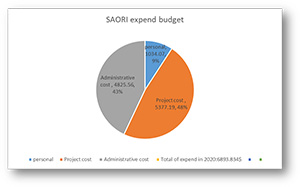
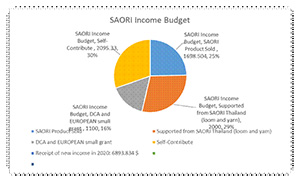
APPENDIX 2 List of Meeting Held
April 8, 2023 -meeting with the SAORI Board of Directors
April 9, 2023 - meeting with Um Amraroth+ the SAORI Organization working group
April 10, 2023 - meeting with Um Amraroth + the SAORI Organization working group
April 11, 2023 - meeting with Um Amraroth + the SAORI Organization working group
April 12, 2023 - meeting with Um Amraroth + the SAORI Organization working group
meeting with Um Amraroth + the SAORI Organization working group
April 13, 2023 - meeting with Um Amraroth + the SAORI Organization working group
April 14, 2023 - meeting with Um Amraroth + the SAORI Organization working group
April 15, 2023 - meeting with Um Amraroth + the SAORI Organization working group
April 25, 2023 - meeting with Um Amraroth + the SAORI Organization working group to discuss the final report
Consultation meeting with the Ministry of Environment - regarding recycling and possible employment of persons with disabilities on April 20, 2023
Consultation with the Ministry of Land Management, Urban Planning and Construction - regarding more rapid implementation of accessibility construction and adaptations for those persons with physical disabilities within the community on April 21, 2023
A site visits to lands proposed for assisted housing for persons with physical disabilities (outside of Kampong Chhnang) was cancelled
A site visits to water park, the central downtown and the riverside and wharf areas of Kampong Chhnang which demonstrated the lack of accessibility accommodation for people with disabilities, especially wheelchair maneuverability issues - April 10 and April 12
A site visits to rural areas outside Kampong Chhnang and the pottery making facility, which could be explored as another potential suitable type of work for persons with disabilities
APPENDIX 3 Khmer Times: National News
(From Google News - April 17, 2023)
Combatting plastic pollution in Cambodia
Khmer Times
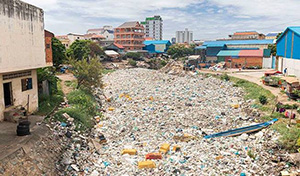
A sewage canal filled with plastic. UNDP
The Ministry of Environment (MOE), the Embassy of Japan, GIZ implemented 3RproMar Project and the United Nations Development Program (UNDP) organized the 3rd National Forum on “Combatting Plastic Pollution in Cambodia” earlier this month.
This forum brought together more than 250 people from the government, development partners and NGOs, the private sector, academia, and the arts. The main purposes were to share Cambodia’s efforts to combat plastic pollution, to feature creative awareness-raising initiatives, and to introduce innovative circular businesses for tackling plastic pollution.
Cambodia’s recent rapid economic and population growth has drastically increased plastic waste, with many negative impacts on Cambodia’s environment and public health.
Choup Paris, Under Secretary of State, Ministry of Environment stated that “To tackle plastic pollution, the Royal Government of Cambodia (RGC) through MoE and line ministries implemented measures to promote the 4Rs (Refuse, Reduce, Reuse, and Recycle) with active involvement of citizens, private sector, and NGOs.”
MsAlissar Chaker, Resident Representative, UNDP Cambodia highlighted that, “plastic pollution has become a planetary crisis, which requires joint action by all countries regardless of income level, taking into consideration the entire lifecycle of plastic from design to production, trade, consumption, and eventually waste management (collection, disposal, and recycling)”.
Echoing her, TaninaiIchitomo, Minister, Deputy Chief of Mission of the Embassy of Japan affirmed that “We urgently need circular solutions to respond to the plastic crisis, through reducing the consumption and production of single-use plastics, and reusing and recycling plastics. The draft sub-decree on plastic management will be a game changer by laying the critical foundation for future directions in plastic management.”
Stefan Messerer, Ambassador of Germany further emphasized that “Tackling the environmental challenge such as plastic pollution cannot be solved by a single party. It requires close partnerships for collaborative innovation and knowledge sharing among governments, development organizations, private sector, and civil society”.
Paris, the Under Secretary of State, Ministry of Environment concluded that “the Ministry is deeply committed to making Cambodia, its cities, waterways, and landscapes clean and free from plastic pollution. I invite everyone present to join our collective effort to preserve the cleanliness, natural beauty and diversity of our beloved country.” UNDP
Using recycling to create jobs for the disabled
(South Africa)
(December 15, 2016 Google Search)
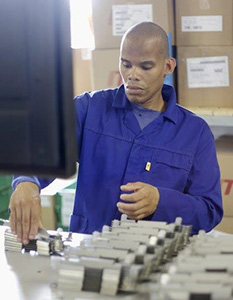
South Africa celebrated International Day of People with Disability on the 3rd of December, which also marks the beginning of the Disability Awareness Month. In honour of this, here is a short write-up of our recent visit to the Orion Organization, who works closely with our partner Kaytech, to uplift the people with disabilities in the Atlantis area.
Having a job, despite the usual Monday morning complaints, is something most of us take for granted. It’s easy to overlook the crucial role employment can play in fostering independence, self-esteem and social integration - especially for people with disabilities, like those working at the Orion Organization in the Western Cape. For these folks, being provided the opportunity to work has opened up a world of opportunity.
Founded in 1982, the Orion Organization focuses on caring and providing for the educational, training and therapeutic needs of children, youth and adults living in the Atlantis area with physical, mental, intellectual and neurological disabilities. The Organization is committed to developing people with disabilities, and therefore provide employment embedded with opportunities for training, skill development and self-growth. Their caring for and skills development of people with disabilities is facilitated through a variety of care facilities and structured programs that encourage and develop each person to the best of their individual abilities.
Bidim is made of 100% recycled PET called rPET from cooldrink bottles
One of the notable partnerships Orion holds is with Kaytech, a geotextile manufacturing company and key PETCO partner. Kaytech manufactures various geotextile products, including Bidim, which is made of 100 per cent recycled PET (rPET) from post- consumer cooldrink bottles. Bidim is an industrial product used in various applications from erosion control against tidal action, to separation in railway applications, to subsoil drainage in roads and homes.
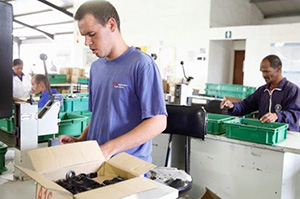
This partnership sees the people of Orion folding and packaging the Bidim for Kaytech’s final distribution to customers. Hannl Cronje, CEO of Orion Organization, says they are extremely proud of the work the partnership produces.
Fulfilment, confidence and a sense of purpose from constructive work
“We provide the perfect environment for the clean packaging of Bidim,” says Cronje. “The people that are working in this program get fulfillment, confidence, and have sense of purpose from the work. It is an opportunity for them to be able to contribute to their community and gain valuable skills while doing so.”
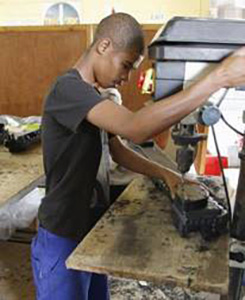
PETCO applauds Kaytech and Orion for this meaningful partnership, which tangibly demonstrates the far-reaching benefits of recycling - not only for the environment, but also towards social and economic upliftment.
Cronje concludes, “We believe it is vital that we continue to provide meaningful opportunities for people with disabilities to be part of the workforce.”
Disabled employees proving effective workers at recycling company
January 22, 2017 (Mainichi, Japan)
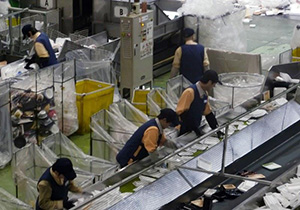
Disabled employees remove non-recyclable trays at FP Corp.'s Kanto recycling plant, in Yachiyo, Ibaraki Prefecture. (Mainichi)
The revised Act on Employment Promotion of Persons with Disabilities went into effect last spring, but only 48.8 percent of companies have met the requirement to have disabled persons occupy 2 percent of their workforce.
Meanwhile, disabled employees at one company headquartered in Fukuyama, Hiroshima Prefecture, are proving themselves effective workers and could spur other companies to hire more disabled staff.
At FP Corp., a disposable food container manufacturer, disabled persons -- including those with mental disabilities -- make up 14.56 percent of its workforce. Its Kanto recycling plant in Yachiyo, Ibaraki Prefecture, has 24 disabled employees, including at least one with a major disability, and all of them are on permanent-employee contracts with FPCO Ducks Co., a subsidiary of FP Corp.
Food containers collected from supermarkets and schools arrive one after another on conveyor belts at the plant, in total numbering around one million a day. Those that cannot be recycled, such as ones with metal foil or ones that are too dirty, are found and removed by the workers.
Kimiko Nishimura, an executive at FP Corp., says the disabled employees "excel at sorting out the items and in their ability to focus. They are more accurate than machines. They work for us regardless of the level of their disability."
Kotaro Nakamura, a section leader at FPCO Ducks, says that at first, perhaps because they were not accustomed to working, the disabled employees would wander off from their post and hide in the factory, forcing him to sometimes chase after them. But after around three months of careful training, they became capable of working effectively. He says they understand when he teaches them that the work is a team effort and that productivity will fall if there are too many stoppages along the line. He also says that having veteran disabled employees teach the new ones leads to better training.
Each of the employees sets their own productivity targets, and this serves to motivate them. Production line leaders are also chosen from among the workers to assist the supervisor.
"Some employees want to become leaders, and this boosts motivation," says Nakamura.
Similarly, at two other FP Corp.-affiliated factories in Bando, Ibaraki Prefecture, disabled persons are the backbone of the workforce. One of the plants, FPCO Ai Pack Co., is a "type-A continued employment support workplace," meaning that it hires people who have a difficult time finding employment at corporations at at least the minimum wage. There, nine disabled people quickly put together and inspect bento boxes.
Junko Yamamoto, who is in charge of service management at the factory, says, "As they got used to the job, one person would begin doing the work that previously took two people to do." The machinery has a safety button that can be activated in the event of an accident, but as disabled people generally do not deviate from the set procedure they have learned, there have been no accidents to date.
FP Corp. began employing disabled persons in 1986. A group called "Ahiru no Kai," comprising parents of intellectually disabled children, asked the company to create employment opportunities for their family members. The company proceeded with the goal not of employing disabled people out of sympathy, but of making them a primary workforce at the factories. Communicating with the workers and giving them responsibility over a range of work gave them motivation, which raised efficiency, which led back to more responsibilities, feeding back into a positive cycle.
Partly due to labor shortages, more companies are looking to employ more disabled people. Ten companies participated in a job fair for people with disabilities in Akihabara, Tokyo, in November last year. A representative for Japan Post Bank Co. said, "We want to have the disabled work for us for a long time, so this opportunity to explain to them and exchange ideas with them is valuable." The disabled jobseekers asked questions like, "Can I work in a wheelchair?" and "Is there a bed to lie on if I feel like I'm going to fall down?"
According to Litalico Inc., a Tokyo-based company that supports the disabled and held the job fair, a growing number of firms are enthusiastic about hiring people with disabilities, evidenced by the many inquiries it receives about hiring disabled employees. "We call on progressive companies to hire disabled employees and create models that will inspire other companies to do the same," a Litalico representative says.
Shigeyasu Tanimoto, general-secretary for a labor union specializing in disabled employees, says, "For both people with and without disabilities, there is meaning in working as an independent adult." He adds, "The number of companies employing the legally set ratio of disabled persons is slowly increasing, but there is still far to go. The government needs to set up consultation centers for both companies and disabled workers on this issue, and provide long-term funding.
APPENDIX 4 Pictures Taken During Assignment
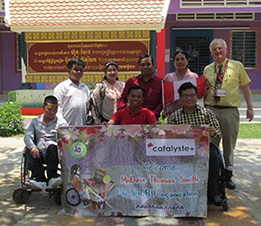 |
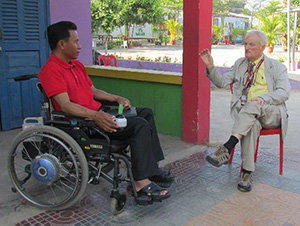 |
Catalyste+ - Smith attending the SOARI Board meeting on April 8, 2023 and discussion with Chair Chan Sarin
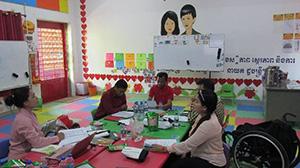 |
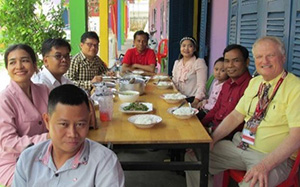 |
Board meeting and lunch served after the Board meeting
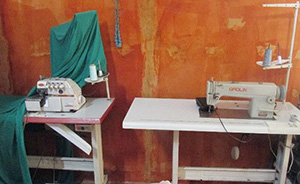 |
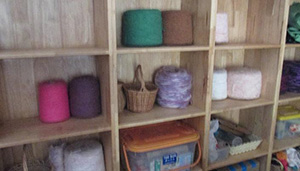 |
Sewing Machines and weaving yarn supplies in support of the SAORI weaving production
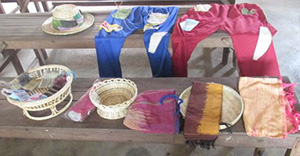 |
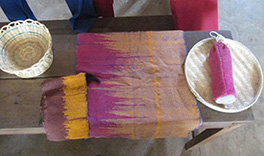 |
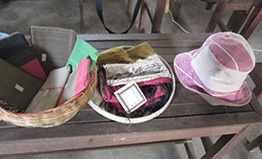 |
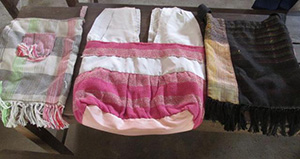 |
SAORI products - scarves, hats, clothing, pouches/bags
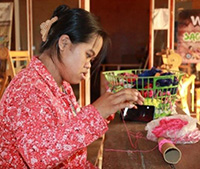 |
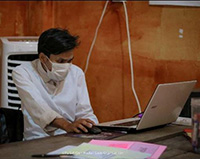 |
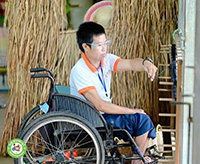 |
SAORI Disabled workers producing weaving products, Computer IT functions
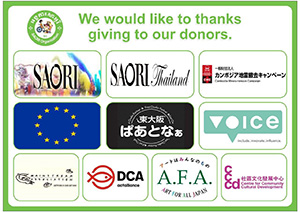
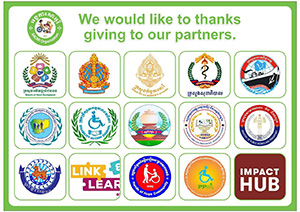
SAORI Partnerships
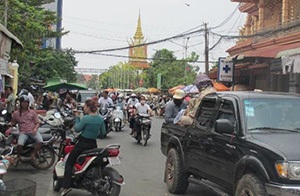 |
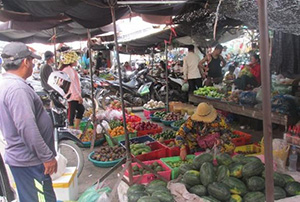 |
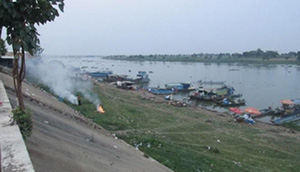 |
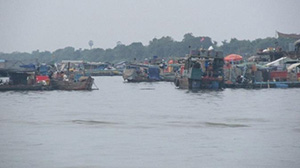 |
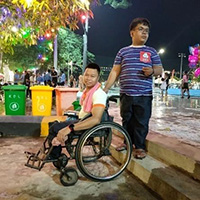 |
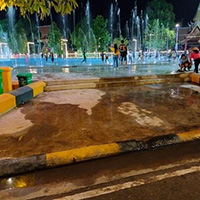 |
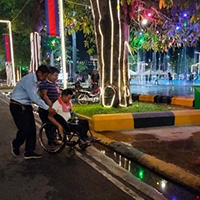 |
Examples of venues not accessible for persons with disabilities - streets, sidewalks, the port, Water park
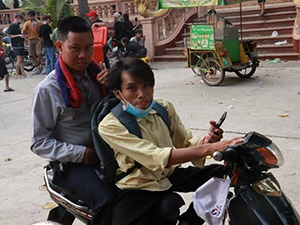 |
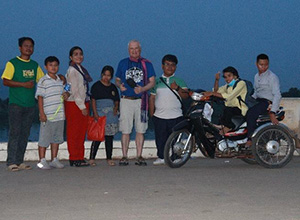 |
A motorbike modified to be driven with two disabled SAORI members onboard
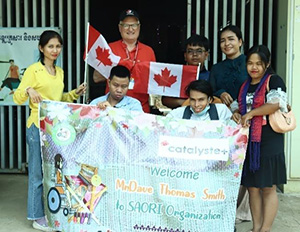 |
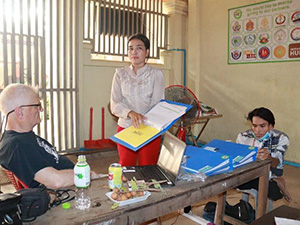 |
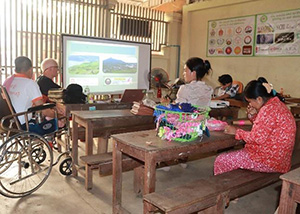 |
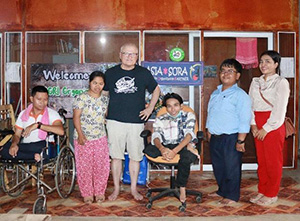 |
Meetings with the SAORI Organization - Persons with Disabilities workshops during assignment
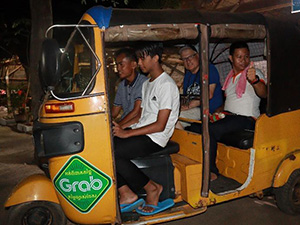 |
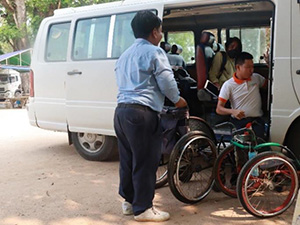 |
Challenging to get around in the tuk tuks and vans which are not designed for accessibility
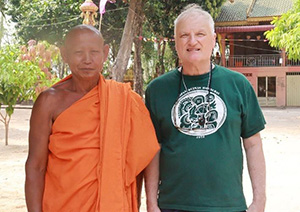 |
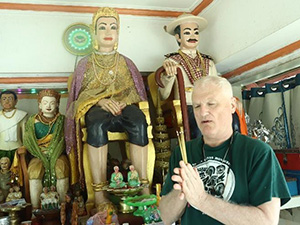 |
Visit to Historic Pagota on April 20, 2023 - building entries have accessibility issues
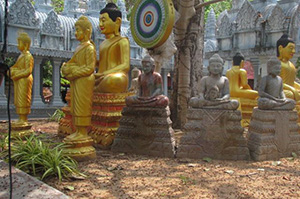 |
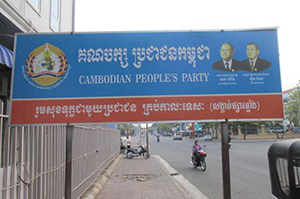 |
Visit to a Pagota Monastary and Promotion billboard for the Cambodian Peoples Party
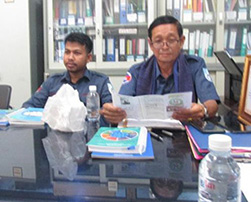 |
 |
Meeting held April 21, 2023 - Ministry of Environment, Catalyste+ and Um Amraroth, SAORI Executive Director regarding Community Recycling and employment possibilities for persons with disabilities
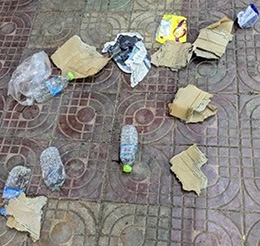 |
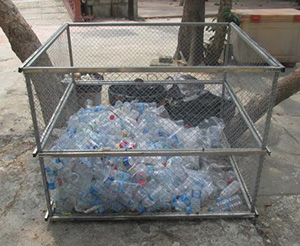 |
Litter of Litter on streets and sidewalks; Recycling Possibilities - a collection bin for plastic bottle - Pagota
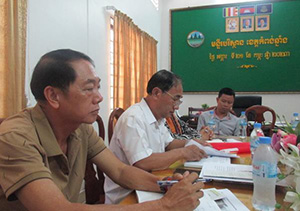 |
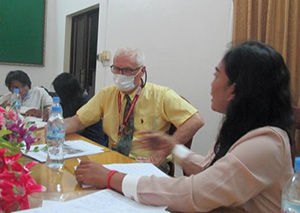 |
A meeting with the Ministry of Environment to discuss recycling with disabled workers, on April 21, 2023
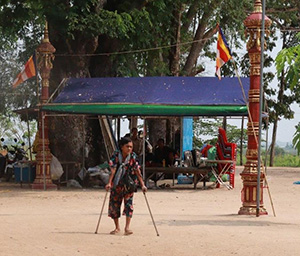 |
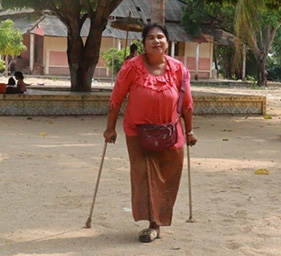 |
Two Ladies with disabilities - Members of the SAORI Organization
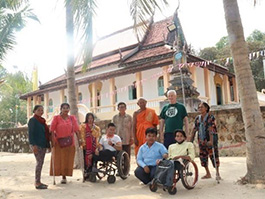 |
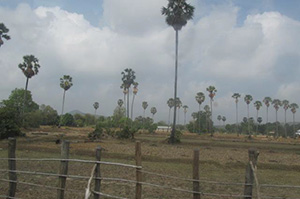 |
The rural area field trip on April 20, 2023
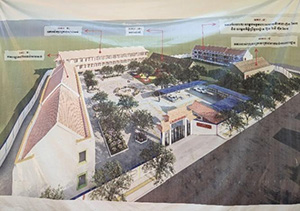 |
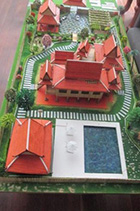 |
Future expansion plan for school facility for Persons with disabilities + Proposed Pagota
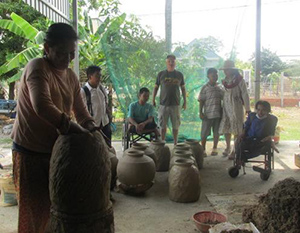 |
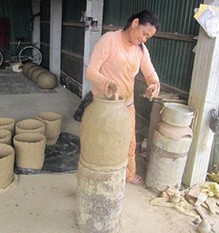 |
Tour of Pottery manufacturing and artisan demonstration on April 23, 2023




